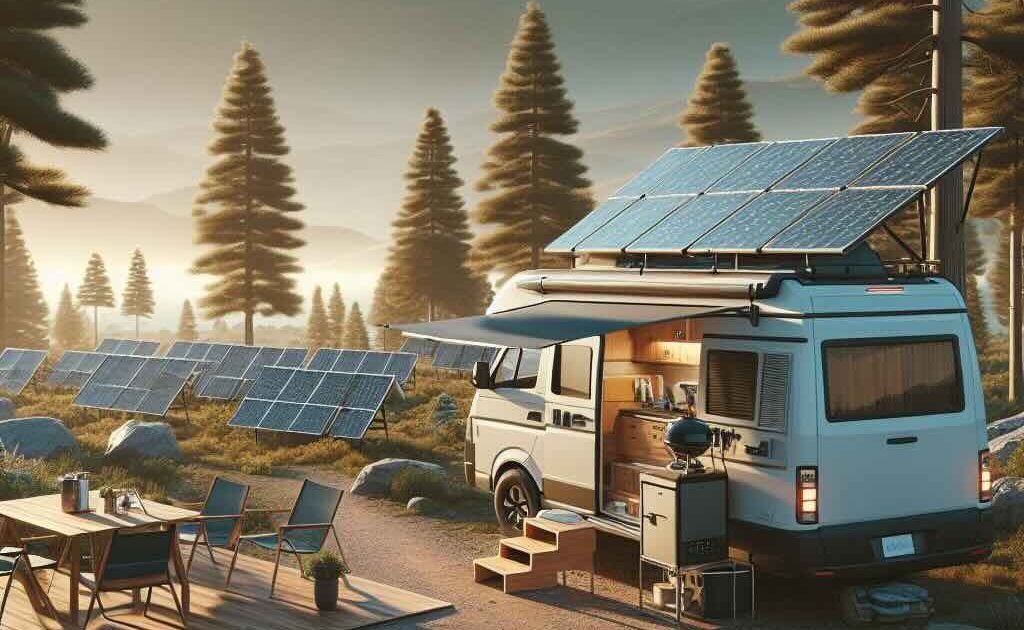How to Power a Camper Off-Grid: The Complete 2025 Guide
One of the best parts of owning a camper is the freedom to explore remote places — far from noisy campgrounds and busy cities.
But when you’re off-grid, the big question is:
“How do you power everything in your camper without hookups?”
At Custom-Way, we’ll show you all the real options — simple, affordable, and reliable.
Main Ways to Power Your Camper Off-Grid
You actually have several choices. Some campers use one method; others combine two or more for the best setup.
1. Solar Power System ☀️
Solar panels are the gold standard for off-grid camper power today.
-
How it works:
Solar panels on your roof (or portable panels) capture sunlight and charge your battery bank. -
Pros:
✅ Quiet
✅ Eco-friendly
✅ No fuel needed -
Cons:
❌ Dependent on sunshine
❌ Expensive upfront (but pays off long-term)
Typical solar setup for campers:
-
200–600 watts of solar panels
-
Deep-cycle AGM or lithium batteries
-
MPPT solar charge controller
-
Inverter (if you want to use 120V AC appliances)
👉 Good to know:
Lithium batteries (LiFePO4) are lighter, faster-charging, and last much longer than traditional lead-acid batteries — but they cost more.
2. Generator (Gas or Diesel) ⚡
Portable generators are the old-school, reliable way to power a camper off-grid.
-
How it works:
You run a gasoline or diesel generator to produce electricity directly or to charge your batteries. -
Pros:
✅ Works anytime, day or night
✅ High power output (good for air conditioners, microwaves) -
Cons:
❌ Noisy
❌ Requires carrying fuel
Recommended for:
-
Powering large appliances
-
Backup when solar isn’t enough
👉 Tip:
If noise is a concern, use a quiet inverter generator like Honda EU2200i or Yamaha EF2200iS.
3. Dual-Battery System with DC-DC Charger 🔋
When you drive your camper, your engine’s alternator produces energy.
You can charge a second battery (your “house battery”) while driving using a DC-DC charger.
-
Pros:
✅ Charges while you drive
✅ Automatic and maintenance-free
✅ Great backup for cloudy days -
Cons:
❌ Limited power if you stay parked for long periods
👉 Common setup:
-
One starter battery (for the engine)
-
One or more deep-cycle house batteries (for the camper)
4. Wind Turbine 🌬️
In very windy areas, small portable wind turbines can add extra charging.
-
Pros:
✅ Works at night
✅ Complements solar power -
Cons:
❌ Unreliable without strong, consistent wind
❌ Requires setup time
Wind turbines are less popular, but in windy regions like deserts or coastal areas, they can be useful.
How to Choose the Best Off-Grid Power Setup
It depends on:
| Need | Best Solution |
|---|---|
| Long stays (weeks) | Solar + battery system |
| Short trips | Generator or engine charging |
| High power (A/C, microwave) | Generator + battery |
| Quiet camping | Solar only |
| Budget option | Engine charging + small solar panel |
Most serious off-grid travelers use a combination of solar and generator power for complete freedom.
Smart Off-Grid Power Tips for Campers
✅ Use LED lights — they use 90% less energy.
✅ Install a battery monitor to keep track of your power levels.
✅ Charge devices during the day when solar is strong.
✅ Insulate your camper to reduce heating/cooling needs.
✅ Carry spare fuel if you rely on a generator.
FAQ: Camper Off-Grid Power
❓ Can I power a camper completely with solar panels?
Yes, but you need a properly sized system: enough solar watts + battery storage for cloudy days.
❓ How many solar panels do I need for my camper?
Most campers need 200–600 watts of solar, depending on energy usage.
❓ Can a generator charge camper batteries?
Absolutely. Many people use a portable generator to quickly recharge their camper’s batteries off-grid.
❓ What’s the best battery type for off-grid camping?
Lithium batteries are the best: lighter, charge faster, and last 5–10 years.
AGM batteries are cheaper but heavier and have shorter lifespans.
Freedom to Go Anywhere
Knowing how to power your camper off-grid means you’re no longer tied to campgrounds or hookups.
Whether you choose solar, generator, engine charging, or a mix — you’ll have the power to live your adventure on your terms.
At Custom-Way, we believe the best camping is free, wild, and independent.
Let’s get you ready to go off-grid the smart way!

